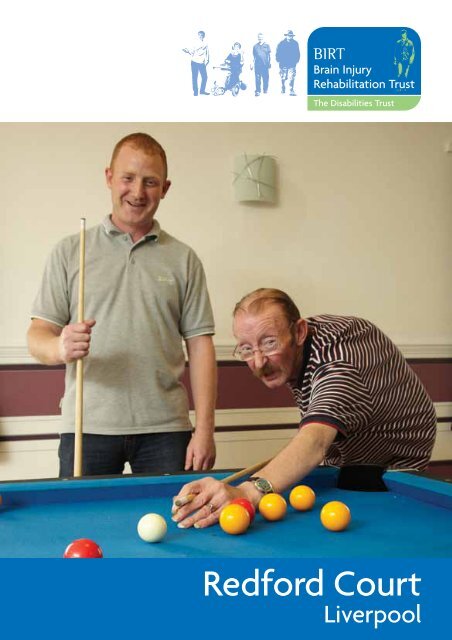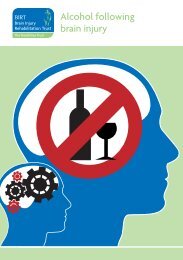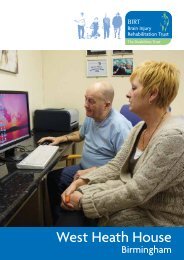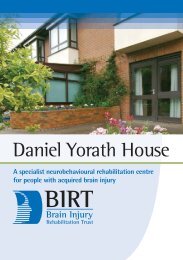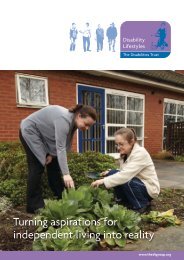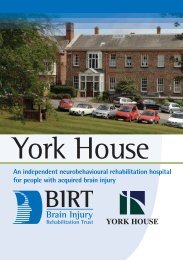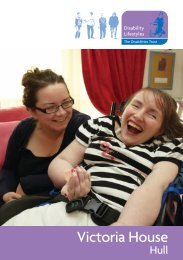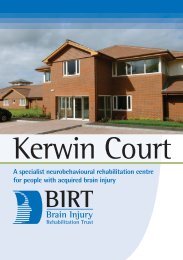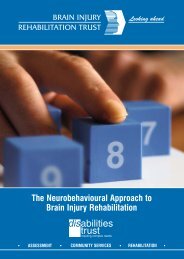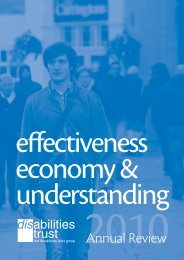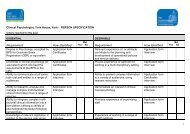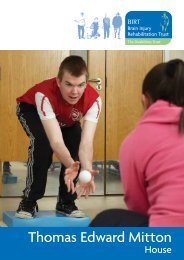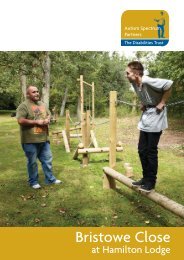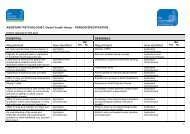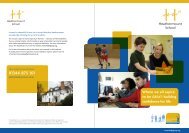BIRT Redford Court - The Disabilities Trust
BIRT Redford Court - The Disabilities Trust
BIRT Redford Court - The Disabilities Trust
- No tags were found...
You also want an ePaper? Increase the reach of your titles
YUMPU automatically turns print PDFs into web optimized ePapers that Google loves.
“We aim to providethe best qualityneurobehaviouralrehabilitationfor people withcomplex andchallenging needsafter brain injury.Ultimately, we wantto enable serviceusers to participatein life as fully aspossible, needingthe least possibleassistance.”Professor Michael Oddy,Director of ClinicalServices, <strong>BIRT</strong>2
What is <strong>Redford</strong> <strong>Court</strong>?Located in Liverpool, <strong>Redford</strong> <strong>Court</strong> is a specialistneurobehavioural rehabilitation centre for people withacquired brain injury. It forms part of the nationwidenetwork of rehabilitation support services provided by<strong>The</strong> Brain Injury Rehabilitation <strong>Trust</strong> (<strong>BIRT</strong>).What does it do?<strong>Redford</strong> <strong>Court</strong> works with people from all walks of lifewho have to cope with a range of cognitive, physicaland/or emotional symptoms following a severe braininjury. We provide specialist residential assessmentand rehabilitation for people who are medically stableand have the potential for increased independenceand social re-integration. Rehabilitation is based on theneurobehavioural model and focuses on enabling peopleto function more independently, develop their livesas they choose and to participate in as many of theirprevious roles and activities as possible.3
FacilitiesOpened in 1997, <strong>Redford</strong> <strong>Court</strong> offers an outstandingsetting for rehabilitation. Set in attractive landscapedgrounds, accommodation comprises 20 large studiostyleapartments and four independent living flats,each with en-suite facilities. All service users have theirown bedrooms, complemented by spacious and wellappointedcommunal areas for dining and relaxation.Rehabilitation takes place in a modern and well-equippedenvironment, with service users enjoying access to a widerange of therapeutic and recreational facilities includingart, cooking, gardening and social events. Rehabilitationgroups also include anger management, social skills,money management and route finding. <strong>Redford</strong> <strong>Court</strong>Lodge, opened in 2006, is a purpose built 5 bedroomedhouse for those with longer term needs.4
EnvironmentAccess to the wider community forms an important partof rehabilitation. Located in the vibrant, multicultural cityof Liverpool, <strong>Redford</strong> <strong>Court</strong> is ideally situated for socialintegration, and also offers opportunities for educationand work placements. Service users enjoy easy accessto the city’s artistic centres, shops and leisure facilitiesincluding nearby Sefton Park.Family support<strong>Redford</strong> <strong>Court</strong> offers a family service where relatives ofservice users are able to find one-to-one education andemotional support.5
AssessmentWhen a service user is admitted to <strong>Redford</strong> <strong>Court</strong>they undergo a 12 week (or shorter) neurobehaviouralassessment to determine their potential for socialreintegration and increased independence. This includesassessments of, for example, cognitive skills, the natureand frequency of any challenging behaviour and theservice user’s ability to engage with the community andcomplete functional daily tasks.At the end of the assessment period, a meeting is heldat which family, funders and other involved parties jointhe team to discuss the results. This enables the teamto identify any barriers to recovery and link these witha course of rehabilitation and support, while taking intoaccount the aspirations of the service user and familymembers.6
RehabilitationIf a formal course of rehabilitation is recommended,the service user begins an individualised treatmentprogramme. This includes learning and therapeuticsessions, personal, social and domestic skills, guidedleisure time, community access, behavioural managementand vocational training and support. Service users areactively involved in reviewing their progress against preagreedoutcomes.<strong>The</strong> average length of a residential placement variesdepending on an individual’s needs. Many serviceusers progress and move on to more independentliving environments. <strong>Redford</strong> <strong>Court</strong> and <strong>Redford</strong> <strong>Court</strong>Lodge also offer continuing rehabilitation for thosewho have completed intensive rehabilitation yet needto consolidate progress before moving on into thecommunity.7
Clinical practice andclinical team<strong>The</strong> clinical team at <strong>Redford</strong> <strong>Court</strong> comprises professionalsfrom a wide range of disciplines, all of whom arerecognised in their field as having special expertise in themanagement of brain injury. <strong>The</strong> team is led by a consultantin neuropsychology and rehabilitation and includesassistant psychologists, a speech and language therapist,physiotherapists, occupational therapists, a vocationaltrainer and rehabilitation support workers.Clinical practice is based on a neurobehavioural approachand focuses on a combination of social and behaviouralinterventions to aid recovery of independence. <strong>The</strong>emphasis of assessment is on a systematic and structuredobservation of behaviour and skills in everyday situationsand tasks. Clinical governance is promoted through <strong>BIRT</strong>’sClinical Executive, a national forum comprising consultantsin neuropsychology and rehabilitation from across <strong>BIRT</strong>’sservices. Led by Professor Mike Oddy, the Clinical Executiveis committed to promoting clinical governance, trainingand research, as well as developing and reviewing clinicalpolicies and procedures.Accreditation<strong>Redford</strong> <strong>Court</strong> has been awarded full accreditation withthe Commission for the Accreditation of RehabilitationFacilities (CARF), and is registered with the Care QualityCommission (CQC), receiving consistently excellent reports.We are an accredited Investors in People organisation.8
Continuum of care<strong>BIRT</strong> offers a nationwide continuum of services for peoplewith acquired brain injury including post-acute hospitalbasedrehabilitation, assessment and rehabilitation,continuing rehabilitation and community support services.<strong>The</strong> duration of placements at <strong>Redford</strong> <strong>Court</strong> varies,depending on the service user’s level of need and theirpotential for rehabilitation.9
Sarah’s StoryAged 19 years old, Sarah sustained a diffuse axonal injury in a road traffic accident. Her injuries left her with a range of neuropsychological and physical problems that required 24 hour care.Reliant on a wheelchair, Sarah suffered from a seriesof health difficulties, including sensory impairmentin her limbs, speech difficulties and ataxia, as well aspresenting challenging and aggressive behaviour whichincluded fire setting. <strong>The</strong>re was also a history ofalcohol and substance misuse. Sarah’s relationship withher family had broken down, with her children beingplaced in care.Before entering the <strong>BIRT</strong> continuum, Sarah resided in 11 differentplacements, including hospital and family care, nursing homes,mental health units and hostels for abused women. Whenshe was admitted to <strong>BIRT</strong>’s assessment service at Fen House,Cambridgeshire, she presented as highly aggressive and noncompliant,requiring 14 hours one-to-one supervised care perday, increasing to two-to-one when accessing the community.Sarah transferred to <strong>Redford</strong> <strong>Court</strong> to be nearer familyand friends After a period of rehabilitation that includedphysiotherapy and speech and language therapy, she movedinto an independent living flat within the grounds of <strong>Redford</strong><strong>Court</strong>. Sarah made significant gains in her physical functioning,speech intelligibility and daily living skills. <strong>The</strong>re was areduction in the frequency and intensity of verbal and physicalaggression, and there were no further episodes of fire setting.Eight years after sustaining her injuries, Sarah has moved to asupported community home to be even more independentand closer to her family and has recently married.10
Outcomes for service users“In our 2010satisfactionsurvey, 100% ofour referrersand purchaserswere satisfiedor more thansatisfied withthe services at<strong>Redford</strong> <strong>Court</strong>.”In 2010, at the time of admission 67% of service userswere rated as requiring full time direct supervision.Upon discharge only 38% of service users were rated asrequiring full time direct supervision. Following theirrehabilitation, there was a 70% decrease in their physicaland verbal aggression in service users discharged in 2010.On admission 56% of service users were not engaged inany productive activity, yet 100% of those discharged wereinvolved in some type of productive activity, includingsheltered or voluntary employment.Ongoing monitoring of the severity of neurobehaviouralsymptoms following brain injury is vital to therehabilitation process.<strong>BIRT</strong> uses a series of standardised rating scales to assesscognitive, emotional and behavioural changes over time.Each service user is assessed during their first month ofadmission. <strong>The</strong>se results are then compared with the samemeasurements sampled during the last month prior todischarge. This includes monitoring of mood, behaviourand motivation, together with any demonstrationof verbal or physical aggression. As well as enablingus to measure service users’ progress, the outcomemeasurement system also acts as a valuable tool forindividual goal setting during the rehabilitation programmeand informs the ongoing care pathway.12
Satisfaction ratingsFeedback is very important to us as it enables us tocontinuously improve our standards of practice. Eachyear we ask service users, families and referrers to offerfeedback on their satisfaction with our service.In 2010, 100% of our referrers and purchasers were satisfiedor more than satisfied with the services at <strong>Redford</strong> <strong>Court</strong>.Positive comments included the high standard of careprovided and very friendly and approachable staff.89% of our service users reported they were happy ormore than happy overall with the services they received,with many highlighting thepositive day-to-day aspectsof life at <strong>Redford</strong> <strong>Court</strong>including the opportunityto go out shopping or for ameal in a restaurant.100% of service users’families were satisfiedor more than satisfiedwith our service andwould recommend us toothers. Many commentedon the high levels ofprofessionalism the service and the progresstheir family memberhas made through theirrehabilitation.13
Quality and value for money<strong>BIRT</strong>’s continuum of care ensures that in most cases areduction in costs occurs as a service user moves towardsgreater independence. On average, the lifetime costsavings are between £800,000 and £1 million, if a serviceuser is admitted within one year of brain injury.*Reducing costs through the <strong>BIRT</strong> continuum - a case study:When Steven came to <strong>BIRT</strong>, any attempt to engage withhim resulted in outbursts of violence and aggression. Aftermoving through <strong>BIRT</strong>’s continuum of services, costs werereduced as follows:Challenging Behaviour Assessment & Rehabilitation CentreReduction of£750 per weekor 39k per annumChallenging Behaviour Continuing Rehabilitation CentreReduction of£438 per weekor 22k per annumAssessment and Rehabilitation CentreReduction of£712 per weekor 37k per annumCommunity Supported Housing scheme<strong>The</strong> savings shown are the costs that would have beenincurred had Steven not moved through the <strong>BIRT</strong>continuum. Coupled with the high satisfaction ratingsfrom service users, families and referring agencies, researchdata confirms that <strong>BIRT</strong> delivers quality and value formoney from admission to discharge.14* Peer-reviewed research data references are available atwww.birt.co.uk/valueformoney. Fees correct at time of print.
Where we are<strong>Redford</strong> <strong>Court</strong> is located close to the cosmopolitan cityof Liverpool, with easy access to the city centre andexcellent rail and road links to all parts of the UK.Service Manager, <strong>Redford</strong> <strong>Court</strong>7 Birt Close, Liverpool L8 7SZTel: 0151 280 8181Fax: 0151 282 5187Email: redford.court@birt.co.ukFor further information about <strong>Redford</strong> <strong>Court</strong> pleasecontact the service manager at the address above.“<strong>The</strong> staff gave mereally terrific support.I now realise justwhat an invaluableresource <strong>BIRT</strong> is.”LukeReferralsReferrals should be made directly to <strong>Redford</strong> <strong>Court</strong>. Weaccept referrals from a wide range of agencies includinghealth, social services, medico-legal and other specialistproviders.15
<strong>The</strong> Brain Injury Rehabilitation <strong>Trust</strong><strong>The</strong> Brain Injury Rehabilitation <strong>Trust</strong> (<strong>BIRT</strong>) provides acontinuum of care for people with acquired brain injury,from post-acute hospital based rehabilitation, assessmentand rehabilitation, continuing rehabilitation and supportedhousing and home support. Through our range ofspecialist services, we aim to enable people to functionmore independently in the wider community and developtheir lives in ways they choose.For more information about our work please contact:<strong>The</strong> Brain Injury Rehabilitation <strong>Trust</strong>60 Queen Street, Normanton, Wakefield, WF6 2BUTel: 01924 896100Fax: 01924 899264Email: director@birt.co.uk<strong>The</strong> Brain Injury Rehabilitation <strong>Trust</strong> is a division of <strong>The</strong> <strong>Disabilities</strong> <strong>Trust</strong> and the means by which it providesits brain injury services.Founded in 1979, <strong>The</strong> <strong>Disabilities</strong> <strong>Trust</strong> is now establishedas one of the UK’s leading charities, offering imaginative,progressive services to people with autism, brain injury,physical disability and learning disability.<strong>The</strong> <strong>Disabilities</strong> <strong>Trust</strong>First Floor, 32 Market Place, Burgess Hill, West Sussex, RH15 9NPTel: 01444 239123 Fax: 01444 244978 Email: info@thedtgroup.org<strong>The</strong> <strong>Disabilities</strong> <strong>Trust</strong> is a company limited by guarantee incorporatedin England and Wales under 2334589 and registered as a charity inEngland and Wales under 800797 and in Scotland under SC038972.Registered office as shown.www.birt.co.uk


